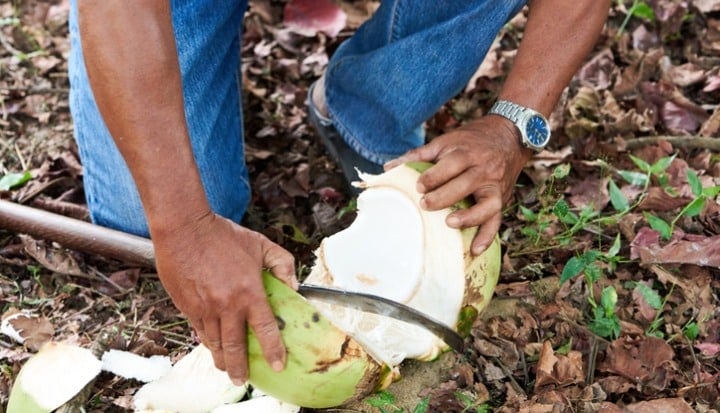In Indonesia and the Philippines – world leaders in coconut production and exportation – most farmers are smallholders that struggle with lack of financing and training. Poor agricultural practices led to aging plantations and declining yields and incomes.
Beginning in 2011, Cargill identified an opportunity to use its unique position to deliver solutions that would help coconut farmers in those countries increase their productivity and profitability through sustainable, innovative agricultural practices, inclusive market access and resilient agricultural communities.
For Cargill, this meant securing sources of certified coconut oil to meet the growing demand on the international market, while leaving a positive impact on the environment and enabling farmers, partners and other critical stakeholders to achieve greater business results and efficiencies.
The project was developed as part of the develoPPP.de program of the German Federal Ministry of Economic Cooperation and Development (BMZ). Along with BASF, Procter & Gamble (P&G), the Deutsche Gesellschaft für Internationale Zusammenarbeit (GIZ) GmbH and other national partners, Cargill trained smallholders in farm management skills to improve their business. Farmers also received training in good agricultural practices, such as intercropping and integrated pest management, to create more resilient farms.
More than 4,000 farmers – over half of them women – received training, and 1,600 of them received additional training and were certified in line with the Rainforest Alliance Sustainable Agriculture Standard.
On average, farmers who were trained and certified report 47 percent higher agricultural income compared to those who didn’t participate in the program. Productivity for certified farmers rose 26 percent compared to non-involved farmers.
Through the project, Cargill and its partners were able to establish the Sustainable Certified Coconut Oil (SCNO) supply chain, a socially responsible, environmentally sound and economically viable supply chain that works for everyone. The SCNO aimed to set up a sustainable and transparent supply chain that matched the partners’ commitments towards people and nature, while also managing related risks.
“We are able to significantly improve the economic opportunities and living standards for farmers and their families through this partnership. In turn, we are lifting up their communities, which are primarily in rural and developing areas,” said Jonathan Sumpaico, managing director for Cargill’s grain and oilseed supply chain business in the Philippines. “Cargill will continue to scale our support based on the great work already achieved with smallholder coconut farmers to increase their agricultural productivity and incomes while advancing the supply of sustainable coconut oil in the world.”
Better productivity, better incomes
The success of SCNO depended on the combined expertise of each partner.
Cargill, which owns and operates copra – the dried meat of the coconut – collecting stations and crushing plants, provided training to smallholder farmers and set up the structures for certification. BASF and P&G Crude processed the refined oils to produce ingredients for home and personal care, as well as the nutrition and health industries.
The companies shared their understanding of the market trends, while GIZ, a German government agency, contributed in capacity building and promotion. GIZ is also managing the project and its implementation in close collaboration with Philippines Coconut Authority, the Agricultural Training Institute and other partners, including the Rainforest Alliance, local universities and NGOs, to ensure local ownership.
Since 2018, the first Rainforest Alliance Certified™ coconut oil has been in production in the Philippines with the support of this partnership.
Making a difference for Cargill chocolate customers
Cargill’s cocoa and chocolate business became the first provider in the world to offer coating and fillings that use coconut oil sourced from Rainforest Alliance Certified™ farms.
In its 2017-2018 sustainability report, the business highlights its commitment to provide sustainable chocolate ingredients.
The sustainable coconut oil is used in coatings and fillings for ice cream, confectionery and bakery applications. This is part of Cargill’s larger commitment to help thousands of smallholder coconut farmers improve their livelihoods, while helping to secure and strengthen a sustainable coconut supply chain.
Editor’s Note:
This article was previously published on the Cargill website and is reproduced with permission.










